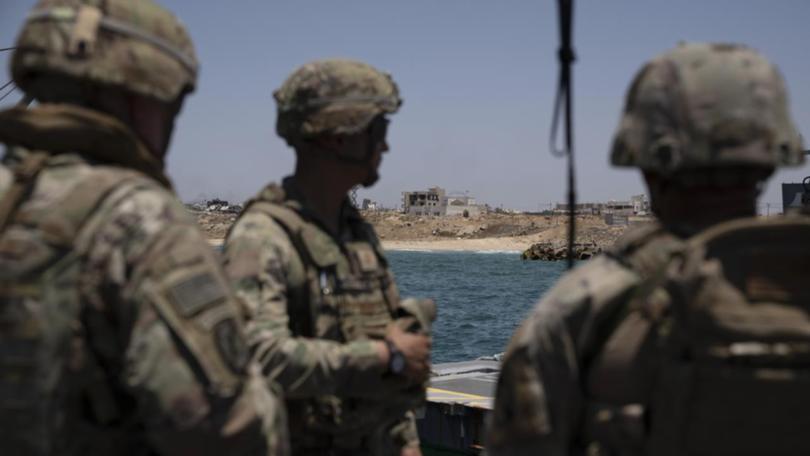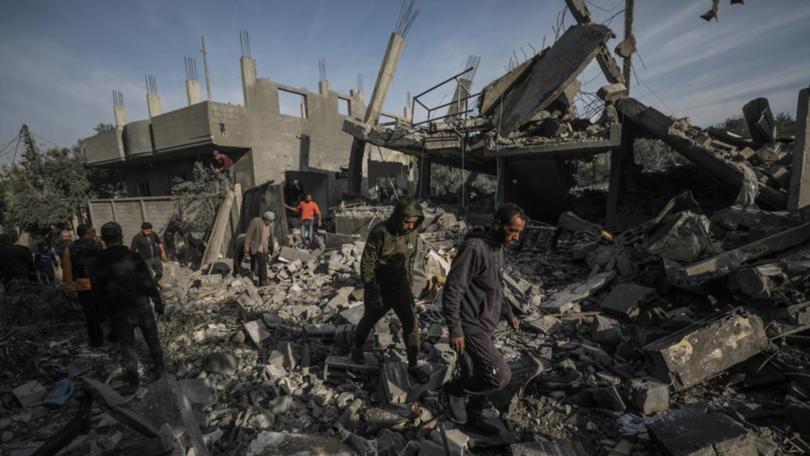THE WASHINGTON POST: US diplomats in region push Gaza ceasefire deal, Syrian transition
The Biden administration is pulling out all the stops to achieve a long-elusive ceasefire deal in Gaza and says the incoming team of President-elect Donald Trump is cooperating to help make that happen.

The Biden administration is pulling out all the stops to achieve a long-elusive ceasefire deal in Gaza and says the incoming team of President-elect Donald Trump is cooperating to help make that happen.
The goal, White House national security adviser Jake Sullivan told reporters in Israel on Thursday, is “to put us in a position to be able to close this deal this month, not later.” In talks with Israeli Prime Minister Benjamin Netanyahu, he said, “I got the sense ... he’s ready to do a deal.”
Sullivan said that the Biden administration, which has just weeks left in power, has had “very good consultation and coordination” with Trump’s team. “We talk to them about how we can send a common message that the United States, no matter who is sitting in the Oval Office, no matter whose party is in charge, wants to see this ceasefire and hostage deal,” he said.
Sign up to The Nightly's newsletters.
Get the first look at the digital newspaper, curated daily stories and breaking headlines delivered to your inbox.
By continuing you agree to our Terms and Privacy Policy.“I wouldn’t be here today if I thought this thing was just waiting until after January 20th,” Sullivan said, referring to the date of Trump’s inauguration.
Trump, in an interview with Time magazine published Thursday, said “things are happening very productively on the Middle East; I think the Middle East is going to get solved.” Netanyahu, he said, “feels very confident in me, and I think he knows I want it to end.”
Sullivan is one of several senior Biden administration officials currently crisscrossing the Middle East in a last-ditch effort to address interrelated crises in the region. Gen. Michael E. Kurilla, head of U.S. Central Command, was with Sullivan in Israel after visiting with U.S. troops and Kurdish allies in Syria.
As Sullivan headed from Israel to Qatar and Egypt, Secretary of State Antony Blinken completed a stop in Jordan and arrived in Turkey, one of the regional powers competing for influence in the wake of the sudden ouster of Syrian President Bashar al-Assad by the Turkish-backed Hayat Tahrir al-Sham rebel group, a onetime al-Qaeda affiliate.
Defense Secretary Lloyd Austin and Gen. Charles Q. Brown Jr., chairman of the Joint Chiefs of Staff, have also been on the phone this week with their counterparts throughout the region.
In Syria, the Biden administration is seeking to promote a stable and peaceful transition to a new leadership while preventing a resurgence of the Islamic State, or ISIS, whose forces in the eastern Syrian desert have been kept in check by U.S. airstrikes and the Syrian Democratic Forces, a Kurdish militia group whose actions are coordinated and enabled by more than 800 U.S. troops based there.
U.S. officials who spoke on the condition of anonymity to discuss sensitive diplomacy said they recognize that Turkey has tremendous leverage in Syria right now and that it may be tempted to press its advantage against the SDF, which the government of President Recep Tayyip Erdogan considers terrorists.
Meeting with Erdogan in Ankara, the Turkish capital, on Thursday, Blinken pressed the U.S. case against overreach, arguing that Turkey benefits more from having a stable neighbor than a future in which Syrian groups continue fighting one another. Blinken, a State Department statement said, “reiterated the importance of all actors in Syria respecting human rights” and stressed “the need to ensure the coalition to defeat ISIS can continue to execute its critical mission.”
But U.S. officials acknowledge that they are racing to keep up with events. During Kurilla’s visit to Syria, Sullivan said, the general was “very deeply in conversation with our Kurdish partners, and we are in conversations with Turkey as well about our expectations and about what we see as the best way forward.”
Kurilla reportedly brokered an agreement under which the SDF retreated from territory controlled by Turkish-backed Kurdish forces in the Syrian border city of Manbij. Keeping the two forces apart, Sullivan said, “is something that is going to require ongoing work and cultivation.”

Sullivan noted the array of risks in a rapidly evolving Syrian political landscape, “including the potential for fracture in that state, as well as power vacuums that can give rise to terrorist groups that can threaten beyond borders, as well as the potential for groups to be in charge in Damascus who bear hostile intent to outside forces, including to neighbors like Israel.”
He defended ongoing Israeli airstrikes in Syria and its military incursions into a U.N.-monitored zone adjacent to the Israeli-occupied Golan Heights as designed to “neutralize” potential threats from “both conventional and weapons of mass destruction” left in place by Assad’s military as it melted away last week amid the rebel offensive.
The United States has had no involvement in Israel’s actions in Syria, U.S. officials have said, and Israeli officials neither sought nor needed U.S. approval. “From the United States’ perspective,” Sullivan said, those actions are “logical and consistent with Israel’s right to self-defense.”
But much of Sullivan’s visit focused on the Gaza ceasefire and hostage negotiations, which he said had become more hopeful in recent weeks - following the Israeli killing of top Hamas and Hezbollah leaders and the U.S.-negotiated ceasefire in Lebanon. Both U.S. and Israeli officials have claimed that those efforts paved the way for the overthrow of Assad.
Hamas is under pressure because “the situation in Gaza now is terrible,” said a former Egyptian official familiar with the negotiations who spoke on the condition of anonymity to discuss sensitive diplomacy. Hamas has provided a list of the names of hostages still alive - including three Americans - as a goodwill gesture and agreed to abandon its earlier demand that Israeli forces withdraw completely from Gaza under any truce deal.
Hamas is under pressure because “the situation in Gaza now is terrible,” the former official said.
After a year of fruitless Israel-Hamas negotiations, mediated by the United States, Qatar and Egypt, Sullivan acknowledged, “we have been in a place before where American officials have stood before podiums and said we are close. And we were close, but we didn’t get there.”
“I believe we are close again.” he said. “Will we get there? It is not yet clear ... but we are determined to try to drive this across the finish line.”
- - -
Birnbaum reported from Amman, Jordan, and Ankara, Turkey. Claire Parker in Cairo and Shira Rubin in Tel Aviv contributed to this report.
© 2024 , The Washington Post
